The Natural State earns its title for its beautiful mountains, rivers, and lakes. Arkansas encompasses two mountain ranges: the Ozarks and the Ouachitas, which make the state ideal for outdoor enthusiasts. Arkansas is also known for its blues music, diamond mines, and agriculture First-time homeowners, retirees, families―there’s something for everyone here. If you want to move to Arkansas, NewHomeSource has compiled a list of the top six places to move to in the state.
1. Pine Bluff
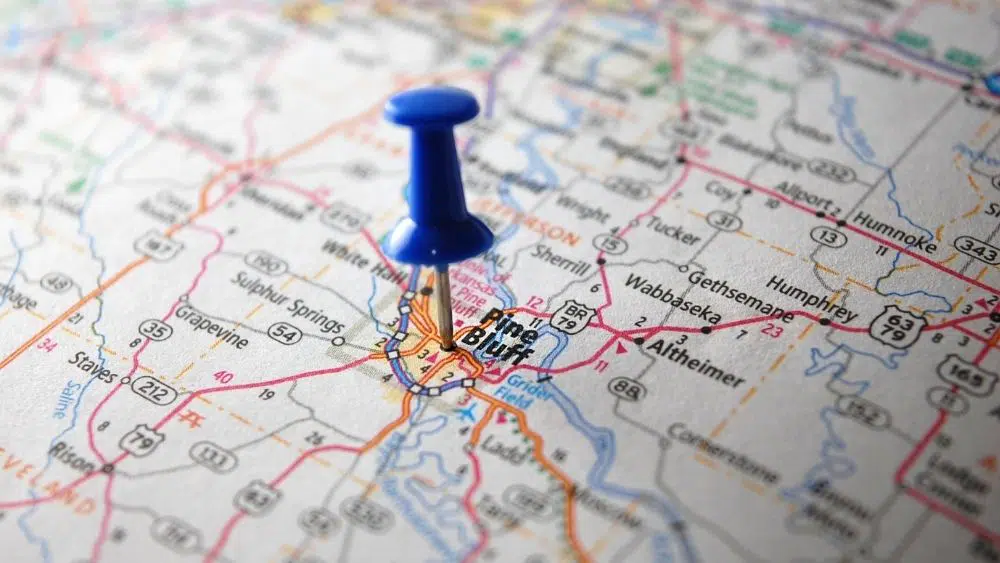
Housing cost to income ratio: 3.32%
Average childcare cost to income ratio: 2.53%
Violent crime index: 72.5
Nonviolent crime index: 81.9
Cost of living index: 69.5
Pine Bluff tops our list of best places to live in Arkansas. Enjoy quality attractions, a welcoming demeanor, and Southern charm. Pine Bluff is sure to capture your heart. Discover what piques your interests with museums, parks, and entertainment.
You will love exploring the exhibits and learning the history at the Arkansas Railroad Museum, the Arts & Science Center for Southeast Arkansas, and the Delta Rivers Nature Center. Downtown is full of stunning murals. The Pine Bluff Convention Center and Saracen Landing are home to fun entertainment and performances. Learn more about some of Arkansas’s sons and daughters at the Arkansas Entertainers Hall of Fame. A talented native of Pine Bluff, James Hayes, has his stunning glass work at the James Hayes Art & Glass Company.
Residents can expect a good mixture of weather conditions here; Pine Bluff sees an annual average of 53 inches of rain, 218 sunny days, and 2 inches of snow. Stay active at Pine Bluffs Aquatic Center. A unique all-inclusive playground is designed for children of all abilities. Saracen Landing is one of the welcoming parks offered by the Pine Bluff Parks & Recreations Department. Cool off at the Splash Park with its programmable jets.
Pine Bluff is home to the Southeast Arkansas District Fair and Championship Rodeo. Community events and festivals keep you busy with fun, music, and food. The holidays are celebrated at the Enchanted Land of Lights and Legends. Fun holiday light displays get you in the spirit of the holidays.
Pine Bluff is moderately liberal and is in the vicinity of 20 hospitals and six schools, including the University of Arkansas Pine Bluff. If you’d like to live in the suburbs, check out White Hall, Sulphur Springs, and Woodlawn.
2. Fort Smith
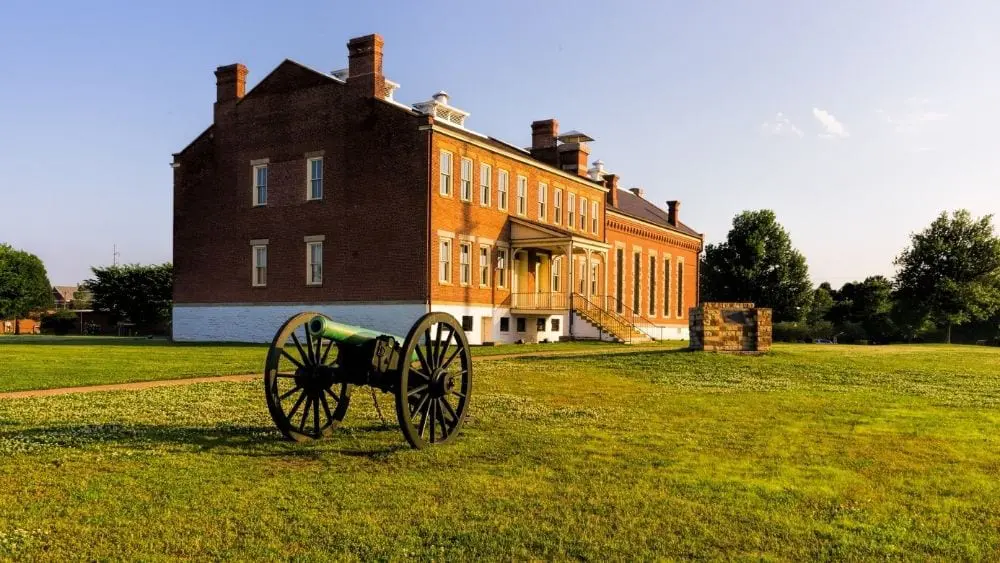
Housing cost to income ratio: 3.34%
Average childcare cost to income ratio: 2.08%
Violent crime index: 40.5
Nonviolent crime index: 75.6
Cost of living index: 76
Located in northwest Arkansas, Fort Smith is a thriving community of over 88,000 residents. The city earns its namesake from Fort Smith, an 18th-century fortress located along the Arkansas River; folks can learn more about its history at the Fort Smith National Historic Site and the Fort Smith Museum of History. Other attractions include a casino, waterpark, and beautiful walking trails that allow you to admire Arkansas’ natural beauty. Fort Smith is a city steeped in history and brimming with modern-day attractions, making it an ideal place to call home. Nestled on the banks of the Arkansas River, Fort Smith offers a unique blend of Southern charm and urban excitement. Popular attractions enlighten you from the rich history at the Fort Smith Historic Site to the Clayton House giving insight into Fort Smith’s early settlers.
Dog lovers will be pleased to know that there are 20 restaurants in the area that allow you to bring your pooch with you. The Fort Smith Dog Park provides a fenced-in space for dogs to run and play, while the Fort Smith Farmers Market allows leashed dogs to accompany their owners. The city also hosts an annual K-9 Kolloquium, a celebration of canine companionship.
Folks moving to Fort Smith can expect to experience an annual average of 42 inches of rain and 15 inches of snow, so be sure to check the radar before going outside. Fort Smith Riverfront Park and the Trail of Tears Mermorial Park will have you out walking and enjoying trails. Set frequent tee times at the Ben Geren Golf Course and the Fort Smith Country Club.
Fort Smith’s vibrant community calendar is filled with exciting events throughout the year. The Fort Smith Symphony Orchestra’s captivating performances, the Fort Smith Blues Festival, and the Fort Smith Riverfront Park’s lively summer concert series are just a few of the city’s many attractions. Be sure to sample the culinary delights and beverages at the Southwest Arkansas Wine & Food Festival.
Fort Smith is a moderately conservative city. The Fort Smith Public Schools provide quality education for students in kindergarten through 12th grade. The district boasts numerous award-winning schools and a strong commitment to academic excellence. Private school options include St. Anne’s School and Subiaco Academy. Fort Smith is home to the University of Arkansas-Fort Smith, a four-year public university offering a variety of undergraduate and graduate programs. The city also hosts a branch of the University of Arkansas at Little Rock and a campus of Western Arkansas University.
Fort Smith is known as the “Birthplace of the American Southwest” due to its role in the westward expansion of the United States. Fort Smith boasts a diverse economy, with major employers in healthcare, manufacturing, and retail. The city is home to major medical centers like Mercy Fort Smith and CHI St. Vincent Fort Smith, as well as manufacturing plants for companies like Trane Technologies and Whirlpool Corporation.
Popular suburbs include Van Buren and Barling. With a multitude of new homes in the Fort Smith area, you are sure to find the perfect fit in this area rich in southern charm. With its affordable housing options, diverse economy, and excellent schools, Fort Smith is an ideal place to raise a family, pursue a career, and enjoy a fulfilling lifestyle.
3. Little Rock

Housing cost to income ratio: 3.89%
Average childcare cost to income ratio: 0.92%
Violent crime index: 72.1
Nonviolent crime index: 95
Cost of living index: 82.5
Arkansas’ capital city comes in as the third best place to live in the state. Located along the Arkansas River, Little Rock is a gateway city to great outdoor recreational activities along the river, including cycling, hiking, and camping. Experience fine arts at the local art museum, symphony orchestra, and performing arts theater. Little Rock served as the capital of the Confederacy during the Civil War.
Little Rock is a thriving city filled with southern hospitality. Nestled in the heart of Arkansas, Little Rock stands as a dynamic city brimming with history, culture, and a vibrant economy. With its affordable living costs, diverse population, and strong economy, Little Rock offers an enticing blend of urban excitement and small-town charm. Make family memories at the Little Rock Zoo. Find major employers in healthcare, government, and finance. The city is home to medical centers like Baptist Health and UAMS Medical Center, these facilities provide comprehensive medical care to residents of the city and surrounding areas.
The schools here are equally enticing. Little Rock public schools provide quality education with innovative programs and initiatives to enhance student learning and prepare them for success in college and beyond. Private school options include Parkview Magnet High School and Pulaski County Christian School. The University of Arkansas for Medical Sciences, is a renowned medical school with a strong research focus. The city also hosts the campuses of the University of Arkansas at Little Rock and Pulaski Technical College.
Little Rock is relatively humid with an average of 50 inches of precipitation but don’t let that keep you inside. Little Rock caters to outdoor enthusiasts of all levels. The city’s extensive trail system, including the Arkansas River Trail and the Big Dam Bridge trail, offers scenic routes for hiking and biking. Parks like Burns Park and MacArthur Park provide ample space for picnics, frisbee games, and leisurely strolls.
Little Rock’s vibrant community calendar is packed with exciting events throughout the year. The Arkansas State Fair, held annually in September, showcases the state’s agricultural heritage with live music, carnival rides, and delectable fair food. The Arkansas Arts Festival, a celebration of visual and performing arts, takes place each spring, while the Little Rock Film Festival brings together filmmakers and film enthusiasts from around the globe.
Dog-friendly places include numerous dog parks including Two Rivers Dog Park, the Burns Park Bark Park, and the Pulaski Heights Dog Park. Little Rock welcomes furry companions with open arms. Several restaurants and cafes also welcome leashed dogs, making it easy to include your furry friend in your outings.
Little Rock’s rich history comes alive at the Clinton Presidential Library, which showcases artifacts and exhibits detailing President Bill Clinton’s life and presidency. The Arkansas Museum of Fine Arts houses an impressive collection of American and European art, while the Historic Arkansas Museum offers a glimpse into the state’s past through exhibits on Native American culture, early settlers’ lives, and the Civil War.
Little Rock is sure to check off your wants and needs list as it makes #3 on our list of best places to live. Prefer life in the suburbs? Check out popular choices like Shannon Hills, Austin, and Salem. Welcoming new home communities in Little Rock will be the ideal place to put down roots and enjoy the Natural State.
4. Jonesboro
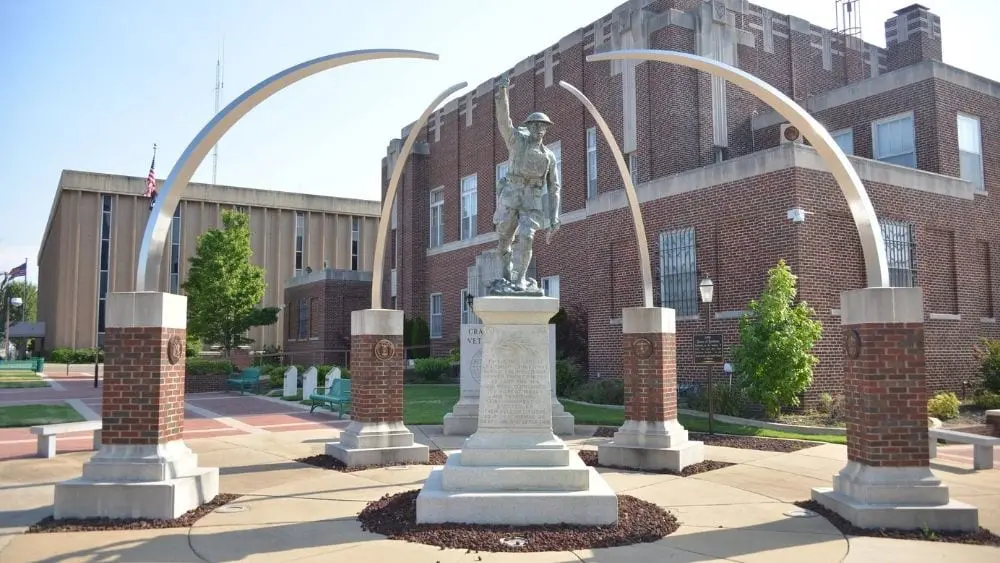
Housing cost to income ratio: 4.06%
Average childcare cost to income ratio: 1.75%
Violent crime index: 25
Nonviolent crime index: 59.4
Cost of living index: 80.4
Coming in 4th on our list is the northeastern Arkansas city of Jonesboro. This moderately conservative city offers its residents plenty of opportunities for indoor and outdoor fun. Jonesboro is home to the historic Jonesboro Courthouse, built in 1874 and listed on the National Register of Historic Places. The city also hosts the annual Jonesboro Hot Air Balloon Festival, a colorful spectacle that attracts visitors from around the region. Jonesboro is known as the “Birthplace of Johnny Cash,” the legendary American singer-songwriter.
During the 218 sunny days per year, take advantage of the warm weather by visiting the A-State Bird Observatory, or head out east to fish and hike along the St. Francis Sunken Lands. Jonesboro caters to outdoor enthusiasts with its extensive park system and proximity to natural attractions. Jonesboro Municipal Park offers a variety of amenities, including a skate park, a splash pad, and ample space for picnics and frisbee games. Craighead Forest Park provides serene trails for hiking and biking, while the Jonesboro Southside Lions Club Park offers fishing opportunities along the Jonesboro Southside Canal.
Jonesboro’s community spirit shines through its vibrant events throughout the year. The annual Jonesboro Spring Festival, held in April, features live music, local vendors, and a carnival. The Jonesboro Summer Nights concert series brings national and local artists to the Jonesboro Amphitheatre, while the Jonesboro Christmas Parade lights up the city streets with its festive spirit.
Further in town, check out the latest gallery at the Bradbury Art Museum, take your family for a fun day at the Hijinx Family Entertainment Center, or visit one of the 15 dog-friendly restaurants to dine with your furry friend. Jonesboro’s rich history and culture are on display at the Jonesboro Museum of Natural History and the Jonesboro Historical Museum. The Arkansas Northeastern Regional Museum of History and Art showcases artifacts and exhibits detailing the region’s past, while the ARTS! Jonesboro gallery features local and regional artists’ works.
Families are impressed with the public and private school options including Jonesboro public schools, Jonesboro Christian School, and St. Bernards Catholic School. Discover the wide range of undergraduate and graduate programs at Arkansas State University-Jonesboro and the University of Arkansas at Fort Smith.
Jonesboro sees 49 inches of rain and 4 inches of snow per year, so prepare for winter accordingly. The political climate is moderately conservative, and residents have access to excellent medical care at the local hospitals. NEA Baptist Memorial Hospital, St. Bernards Medical Center, and Jonesboro Regional Medical Center are great facilities providing comprehensive medical care.
Jonesboro, Arkansas, is a charming city nestled in the northeastern corner of the state, offering a blend of Southern hospitality, outdoor recreation, and a strong sense of community. With its affordable cost of living, excellent schools, and diverse job opportunities, Jonesboro is a great Arkansas locale. Popular Jonesboro suburbs include Rockwell, Magnet Cove, and Hot Springs Village. Major employers in healthcare, manufacturing, and education boost the economy. The Some employers offering employment opportunities include Nestle and ConAgra Foods. Arkansas State University-Jonesboro is also a significant employer in the city.
Why consider Jonesboro for your new home? Jonesboro offers a welcoming and affordable place to call home, with a strong sense of community, excellent schools, and a variety of outdoor recreation and cultural attractions. Whether you’re seeking a family-friendly environment, a vibrant social scene, or a thriving economy, Jonesboro might be just what you are looking for.
5. Fayetteville
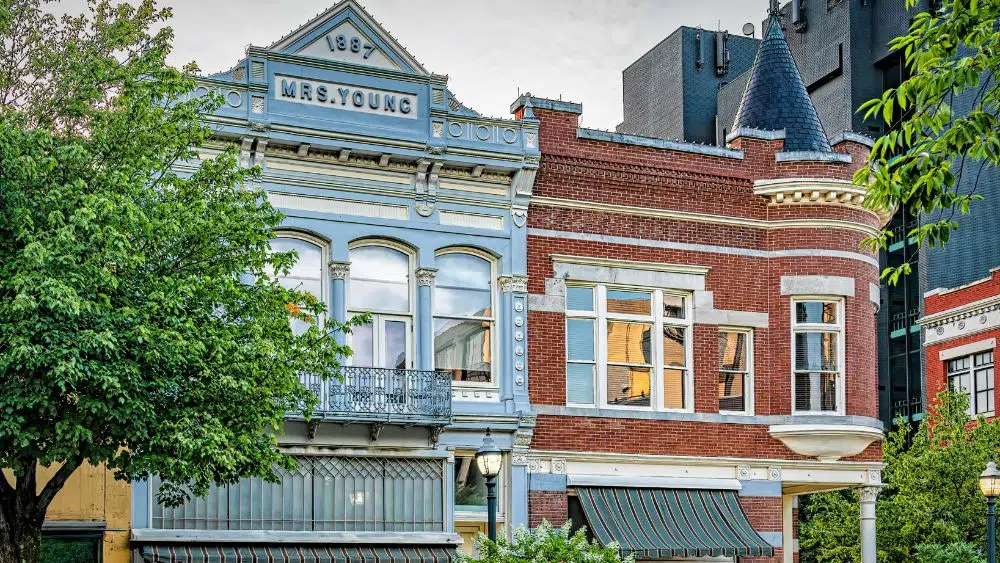
Housing cost to income ratio: 4.54%
Average childcare cost to income ratio: 1.64%
Violent crime index: 33.7
Nonviolent crime index: 61.2
Cost of living index: 92.9
Fayetteville, Arkansas offers an array of new home communities to put down roots. Nestled in northwestern Arkansas, Fayetteville provides easy access to the Ozark Mountains. Fayetteville is known as the “Birthplace of Walmart,” as Sam Walton, the founder of Walmart, opened his first store in the city in 1962.
Outdoor enthusiasts will love that Fayetteville is a gateway to the mountains, but that the city offers 4,000 acres of land to explore, including 40 miles of paved and natural trails. The Razorback Greenway is a paved trail stretching 18.5 miles making it one of the longest urban trails in the United States. Lake Fayetteville provides a picturesque setting for kayaking, canoeing, and paddleboarding. Fayetteville’s weather is typical for the region, with 45 inches of rain and 219 sunny days expected per year.
The Botanical Garden of the Ozarks sits along Lake Fayetteville and offers another glimpse of Arkansas beauty. The cultural scene is just as rich as the natural wonders; from its music festivals, performance theaters, and art museums, there’s always something artistic on the horizon. Fayetteville’s rich history and culture are on display at the Fayetteville Museum of Art, showcasing works from regional and national artists, and the Fayetteville History Museum, which chronicles the city’s past through exhibits and artifacts. The Walton Arts Center, a vibrant cultural hub, hosts a variety of performances, from Broadway shows to classical music concerts.
Fayetteville’s community spirit comes alive through its vibrant events throughout the year. The Fayetteville Farmers Market, held every Saturday from April to October, showcases local produce, handcrafted goods, and live music. The Fayetteville Roots Festival, a celebration of bluegrass and Americana music, takes place each fall. The Fayetteville Winter Farmers Market, held indoors during the colder months, provides a cozy atmosphere to enjoy local produce and artisanal goods. The city is very dog friendly, with over 40 restaurants welcoming dogs. The city boasts several dog parks, including the Centennial Park Dog Park, the Leathers Park Dog Park, and the Walker Park Dog Park, where dogs can socialize and run freely.
The University of Arkansas, a renowned research university with a diverse range of undergraduate and graduate programs is in Fayetteville along with a branch of Northwest Arkansas Community College. Educational opportunities are great for public and private school choices. Medical care is covered with exceptional hospitals like Washington Regional Medical Center, Northwest Medical Center – Fayetteville, and Fayetteville Veterans Affairs Medical Center are there to serve your family.
Fayetteville leans politically liberal and encompasses a welcoming demeanor in the heart of the Ozarks. Whether you’re seeking a vibrant downtown scene, a tranquil escape in nature, or a stimulating academic environment, Fayetteville checks off lots of boxes.
6. Hot Springs
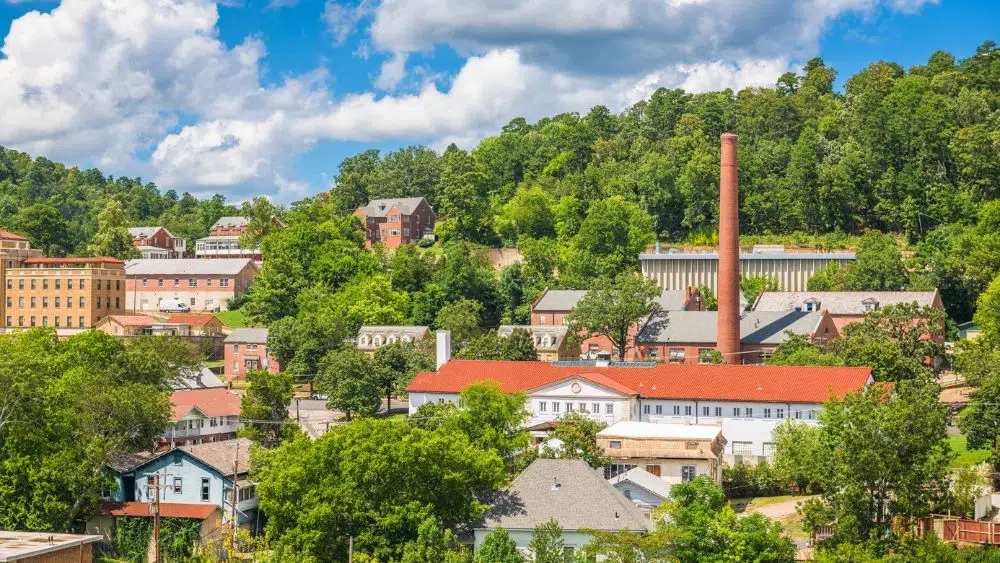
Housing cost to income ratio: 4.62%
Average childcare cost to income ratio: 2.46%
Violent crime index: 37.7
Nonviolent crime index: 95.3
Cost of living index: 80.9
Hot Springs is appropriately named after the natural hot springs in the area. “Spa City” is named as such due to its abundance of these natural hot springs. Visit Bathhouse Row to enjoy the therapeutic water. Some of these relaxing spas date back to the 19th century. Nestled amidst the Ouachita Mountains, Hot Springs, Arkansas, is a charming city renowned for its naturally heated springs, rich history, and vibrant community spirit.
Embrace the great outdoors by hiking through Hot Springs National Park (bring your dog along too!) or visiting Garvan Woodland Gardens. With an average annual rainfall of 57 inches, this moderately conservative city is the wettest on our list. For those seeking more adventurous pursuits, Lake Ouachita, just a short drive away, provides opportunities for boating, fishing, and swimming.
Enjoy a myriad of activities like casinos, country clubs, and museums. The Hot Springs Blues Festival, held annually in June, attracts blues enthusiasts from around the region. The Hot Springs Spring Festival, a celebration of music, food, and crafts, takes place each spring. The Hot Springs Christmas Parade, a festive spectacle with illuminated floats and marching bands, lights up the city streets during the holiday season. Hot Springs’ rich history comes alive at the Fordyce Bathhouse Museum, a restored bathhouse showcasing the city’s thermal water heritage, and the Gangster Museum of America, which chronicles the era of Prohibition and organized crime.
Whatever you choose to do, you can rest assured that medical care is never far away because Hot Springs is served by renowned hospitals including CHI St. Vincent Hot Springs, National Park Medical Center, and Hot Springs Rehabilitation Hospital. Explore great educational opportunities at private schools like Oakridge School and St. John’s Catholic School or the Hot Springs School District with magnet schools. Hot Springs is home to a branch of Arkansas State University and a campus of National Park Community College.
From natural wonders to a checkered gangster past, Hot Springs is filled with interesting attractions and friendly people. Interested in living in the suburbs? Check out popular neighborhoods like Winan Hills, Red Oak, and Lake Hamilton. From the thermal waters to mountain escapes to historical attractions, come see what the fuss is about in Hot Springs. Find your next new home in the Hot Springs area.
This list was compiled using statistics for cost of living, average housing costs, average childcare costs, and crime indices.

Sarah graduated from Trinity University in 2012 with a degree in International Relations and Political Science. She writes blogs on new homes, decor, communities, and more for NewHomeSource. When she’s not writing, you can find her spending time with her three cats.
 Cash-Out Refinance Explained
Cash-Out Refinance Explained
Al Fink
What about a survey on Eureka Springs? Where does it stand?